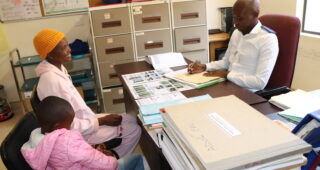I Survived Cervical Cancer
Madaemane Alphoncina Tsunyane is a 52-year-old mother of seven living in Roma, Lesotho. She is also a cervical cancer survivor. Her ordeal has made her a fierce advocate for cancer prevention, screening, and treatment.

There are rarely warning signs when cervical cells first become abnormal, but as the cancer progresses, symptoms may arise, such as bleeding or pain during sex. Other signs include unusual vaginal discharge, vaginal bleeding between periods, and bleeding after menopause.
In 2018 Tsunyane noticed some of those changes in her body.
“I had pain during sex and would bleed thereafter, but I did not take it seriously as I never knew that these were cervical cancer symptoms,” says Tsunyane.
As her illness worsened, Tsunyane’s body became so weak she was unable to take care of herself. Although she had full support of her children, Tsunyane resented the impact her illness was having on them. As a mother she always took pride in caring for them, but through her illness she was unable to do so—and they, in fact, had to care for her.
“My 27-year-old daughter, who was already married, would come home and look after me at times. But my younger daughter, who was just 16 at the time, took care of me full-time. She would wash my clothes, which would be dirty because of the heavy bleeding,” says Tsunyane.
Tsunyane recalls how, as her illness worsened, her younger daughter was sitting for her grade 10 examination. “Through the grace of God, my daughter passed, but I still believe that she could have done better if not for my illness.”
The symptoms of illness affected Tsunyane’s self-esteem and mental health. She could not stand the odor that accompanied the cancer, so she would isolate herself from her children, wanting to be alone. “I was smelling so badly that I would not sit around my children nor other people.”
Madaemane Alphoncina Tsunyane’s ordeal has made her a fierce advocate for cancer prevention, screening, and treatment.
One day in December 2018, Tsunyane lost so much blood she was rushed to the hospital, where she was diagnosed with advanced cervical cancer, stage 3B.
Lesotho does not have advanced cancer treatment capacity, such as chemotherapy or radiation, so Tsunyane had to be sent for treatment in South Africa. Then in February 2019, she anda group of other Basotho suffering from cancer traveled to India to continue treatment.
Due to the advanced stage of her cancer, Tsunyane had to endure chemotherapy for six weeks, as well as internal and external radiation therapy. She said that the chemotherapy treatment was painful and resulted in hair loss, dark nails, and fatigue. She also developed teary eyes, weight loss, and pink lips.
All these changes affected her emotionally, but, nevertheless, she survived.
Today Tsunyane shares her story as a cervical cancer survivor with the hope of educating other women on cervical cancer and encouraging them to screen early and often to ensure early detection and treatment. She educates women in person at women’s groups and though social media channels and radio.
Today Tsunyane shares her story as a cervical cancer survivor with the hope of educating other women on cervical cancer and encouraging them to screen early and often to ensure early detection and treatment.
Cervical cancer can be prevented, says Dr. Oluwasami Akintade, the director of Sexual and Reproductive Health at the Elizabeth Glaser Pediatric AIDS Foundation (EGPAF). He says that first line prevention includes getting vaccinated for HPV (by girls before sexual exposure), using condoms, avoiding smoking, delaying sex debut among youth, and avoiding multiple sexual partners.
He indicated that secondary cervical cancer prevention involves regular screening by visual inspection with acetic acid, visual inspection with iodine, pap smears, and HPV testing. Most women between ages 25 and 49 should be screened every three years, and women living with HIV should be screened every two years. Women older than 50 can reduce screening to every five years. If any screenings identify abnormal cells, or positive test results for cervical cancer, the women can be referred to further testing or treatment, both of which can prevent further HPV.
Most women between ages 25 and 49 should be screened for cervical cancer every three years, and women living with HIV should be screened every two years.
Cervical cancer is the most common cancer among women in Lesotho. However, only pre-cancerous and early-stage cancers are currently managed in the mountainous nation. Most advanced cases are currently referred out to neighboring South African hospitals. This makes early identification of cervical cancer essential.
EGPAF-Lesotho integrated cervical cancer screening, diagnosis and management into antiretroviral services as part of routine HIV care since 2018. The program is supported by the U.S. Presidents Emergency Plan for AIDS Relief (PEPFAR).
Team EGPAF
Lesotho
Community Mobilization



